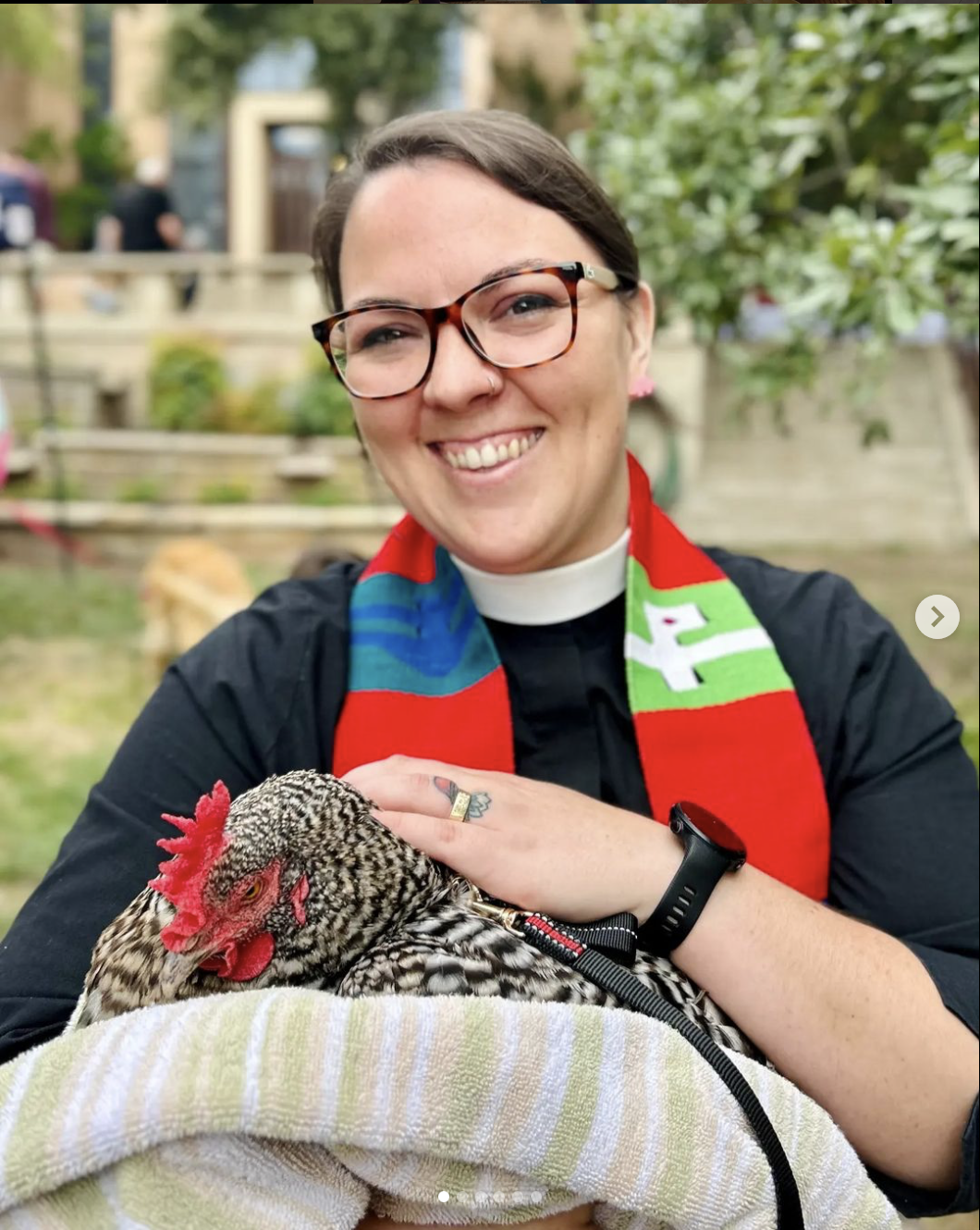Navigating Dual Identities
Reflections on Women in Leadership Roles Within Christian Communities

As promised, I have a special treat as Women’s History Month comes to an end. This week’s article was written by Reverand Reagan Gonzalez, a guest of I AM James Gómez and my family’s priest. Reverand Reagan is the Associate Rector at St. Luke’s Episcopal Church. She is also a mom, feminist, liturgy aficionado, and lover of great coffee. This article explores the unique challenges and opportunities faced by women who serve as leaders in Christian spaces while navigating gender expectations and societal norms. I hope y’all enjoy the piece and learn from it as much as I did!
I AM JAMES GÓMEZ is a reader-supported publication. To receive new posts and support my work, consider becoming a free or paid subscriber.
I was in seminary the first time that I heard that the Samaritan Woman from the fourth chapter of John’s gospel was not a prostitute. I was twenty-four at the time, the youngest in my class, and one of four women.
We’ve written her in that way because she was at the well in the middle of the day, and because she’s had multiple husbands and is currently “with” a man that is not her husband. But there are other literary and hermeneutical approaches to her character. Her being present at the well when “it was about noon” is juxtaposing her character against Nicodemus who came to Jesus “by night” in the previous chapter.
Nicodemus, a well-known Pharisee, should be able to see and believe all that Jesus tells him, but he struggles. The Samaritan Woman, an outsider to the faith, encounters Jesus, and then evangelizes her whole village. She shows us what seeing and believing look like in comparison to Nicodemus, who sneaks around in the dark with doubts.
Jesus and the Samaritan Woman’s conversation is the longest one in the whole gospel. This is not a story about a woman’s sexual past, but about her strong faith (she knows her stuff and is ready to debate Jesus right from the start), and her ability to change and be changed when she is presented with a new way that God is working.
I could go on and on, as there are many more wonderful details to share about this story from a feminine hermeneutic; however, I will just say that from that moment on, I knew that I could carry the Samaritan Woman as a sort of companion in my own journey of ordained ministry. She knows what it is to have the church re-tell her story from their own perspective. She knows what it is to be sexualized and judged by gender standards not put on her male peers. She knows what it is to tell Jesus’ story anyway and claim her own place in the line of faithful disciples.
From classic lines about smiling more, or how much prettier I look when I do my hair and makeup, to more intrusive questions about how I manage to be a minister with young children, I know what it is to be asked, or worse told, about my calling in ways my male colleagues do not.
I have been the first woman or worked directly under the first woman at all the parishes I’ve been at since seminary forward. Have we come a long way? Yes, but we have not arrived at full equality. I say this knowing I write from a place of great privilege as a cis white woman. My colleagues of color and/or queer colleagues have similar or worse stories to share about the issues of the institution that is the universal Christian Church.
One would think that the folks who deny women’s ordination, refuse to take communion from us, and won’t stay to hear us preach would be the most painful. However, those folks I can write off. I don’t owe them proof of my validity, God called me to this work, not them.
It’s the friends on the inside who acknowledge the lack of diversity as an issue, but who quietly maintain the status quo that pang my heart the most. It is one thing to name an injustice in God’s kingdom, and another thing entirely to put it on a cross and let it die so that resurrection can take place.
So, what’s a girl to do? Some days I’m ready to hang my hat up and try out for another sport, where at least I won’t be surprised by the sexism, ageism, and other isms and phobias that hold anyone who isn’t a straight cis white male back. That’s supposed to be common in the secular sphere after all, but in the church, the place where “There is no longer Jew or Greek; there is no longer slave or free; there is no longer male and female, for all of you are one in Christ Jesus.”? Heartbreaking.
But then I think back to the Samaritan Woman. If she can do it, along with all the other matriarchs from Eve forward, then I can, too. Not because I’m particularly brave, prophetic, or wise, but because Jesus called me, and Jesus will see me through.
One approach that always seems to help is humor. When I had to preach on the feast of St. Monica, St. Augustine’s Mother, I recall finding very little information about her. Commentaries would speak about her motherhood to Augustine, and then trail off about his accomplishments. Monica was the one who raised him, while in an abusive marriage to a man who was not Christian. Monica was the one who guided and prayed for her son, the one who read him scripture and introduced him to worship and the church. In my sermon, therefore, I noted that St. Augustine might just be the most famous theological mansplainer out there. It got a good chuckle, but also noted an unspoken truth: even when left out of books, stories, and pictures, the women are there. We always have been, and we always will be.
Our unique gifts, some traditionally thought of as attributes assigned only to women and some that are still traditionally seen as male attributes are needed in the church. We don’t need to power suit our way into the pulpit, and we don’t need to smile more (or less), we don’t need to be always rebellious or always amenable, with full makeup or no makeup to show how feminist we are. We need to be ourselves. Jesus called each of us, each human being, not as we should be or as he hopes we become, but as we are.
Do not be afraid to live out your story, even as you know the world and the church will tell their own version. Do not be afraid to follow Jesus into all the vocations he calls you to. Do not be afraid that the resurrection story is somehow only partially yours. In the moments when the validity of your call comes into question, do not forget that the Holy Spirit called you first, and whatever authority is bestowed upon you, or not bestowed upon you, it pales in comparison to the crown of Christ that rests on your forehead, and it will guide and comfort you through the hardest of days.
Stand on the firm foundation that God seeks you, just as you seek God, and that there is a whole sisterhood of saints surrounding you and rooting for you, in this moment and forever.
I AM JAMES GÓMEZ is a reader-supported publication. To receive new posts and support my work, consider becoming a free or paid subscriber.
